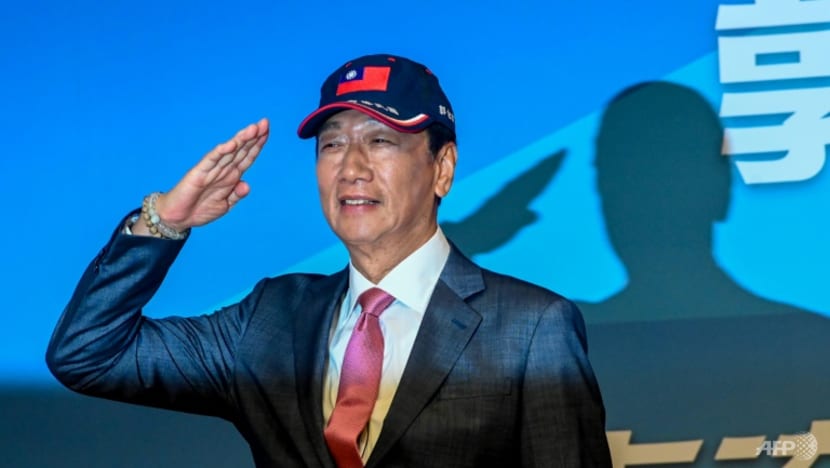Despite prominence, Foxconn’s Terry Gou trails far behind other candidates in Taiwan presidential race: Analysts
Mr Gou has announced his bid for presidency as an independent candidate, pledging to mend ties with China and boost Taiwan’s economy.

Foxconn founder Terry Gou salutes as he announces an independent run for president in Taiwan. (Photo: AFP/Sam Yeh)
Taiwan's presidential race is heating up with a late entry by Foxconn founder Terry Gou.
While Mr Gou is a household name in Taiwan as one of the island’s most prominent and successful businessmen, his rating is trailing far behind other candidates, said political observers.
“He's extremely successful. He has large business operations in China, and is familiar with the Chinese leadership. This is his selling point – as the person who can negotiate with Beijing, and maintain the status quo and peace between Taiwan and China,” said Mr Ross Feingold, director of business development at security advisory firm SafePro Group.
“However, his support level has been lagging far behind what it would take to actually win the presidency.”
Mr Gou on Monday (Aug 28) announced his bid for presidency as an independent candidate, pledging to mend ties with China and boost Taiwan’s economy.
However, close business links to China and his stance on cross-straits relations have sparked concerns among voters, said analysts.
The billionaire entrepreneur’s rating was at about 9 per cent in recent polls, Mr Feingold told CNA’s Asia Now. This was in stark contrast to frontrunner Mr William Lai of the ruling Democratic Progressive Party (DPP), who is in the lead at more than 35 per cent.
Also polling ahead of Mr Gou are former Taipei City mayor Ko Wen-je of the relatively young Taiwan People's Party (TPP) and New Taipei City mayor Hou You-yi of the main opposition Kuomintang (KMT).
CROWDED PAN-BLUE CAMP
Mr Gou’s entry has made the non-DPP camp even more crowded.
Analysis said this could cause votes for the pan-blue side – which favours closer ties with China – to be split and benefit the incumbent DPP.
Dr Chong Ja Ian, an associate professor at the National University of Singapore, said Mr Gou sports a similar profile to the other two candidates running against DPP’s Mr Lai, which might make it difficult for him to stand out.
“They all supposedly want some sort of closer relationship with China. At the same time, they are all generally pro-business,” said Dr Chong, whose research focuses on international relations in Asia-Pacific and Chinese foreign policy.
In an effort to band the opposition together in a united stance against the ruling DPP, Mr Gou initiated the so-called Mainstream Opinion Alliance and invited fellow presidential hopefuls Hou and Ko.
However, Mr Feingold said the alliance is unlikely to gain a foothold, as each party wants its own candidate to gun for the top job. Neither KMT nor TPP has shown interest in forming a coalition.
“To have some kind of joint ticket, somebody would have to give up being the presidential candidate, and take on some other role if they win, such as the vice president. So far, that simply hasn't happened, there's no alliance,” he said.
TERRY GOU’S HURDLES
With the January election less than half a year away, Mr Gou will need to drastically increase his popularity in order to get a shot at the presidency.
Analysts said multiple roadblocks stand in his way, the most immediate of which is to secure around 290,000 signatures by early November to qualify as a candidate.
Mr Gou’s remarks on the Taiwan-China relationship has also put him on “shaky ground” with voters, Dr Chong said. His take on the so-called 1992 consensus, and the “one country, two systems” formula proposed by China, has not struck a popular chord with much of the electorate.
“For many Taiwanese voters, the ‘one country, two systems’ formula has lost a lot of cache after what happened in Hong Kong. They feel that China is not willing to live up to its promises,” he said.
Dr Chong added that Mr Gou needs to either offer an alternative proposal, or divert attention away from cross straits ties to other aspects of his candidature.
Mr Gou’s China links and Foxconn scandals – the world’s largest iPhone factory has for years been accused of worker exploitation and poor working conditions – will also be heavily scrutinised by the DPP and foreign observers, said Mr Feingold.
When asked if Beijing is likely to favour Mr Gou as Taiwan’s president, given his ties to the mainland and his more pro-China position – compared to the DPP, at least – Mr Feingold said China’s stance on Taiwan will not change regardless of who wins the election.
“China’s policy towards Taiwan, which is built around unification and the potential use of military force (to achieve that), is not going to change. Whoever becomes the president of Taiwan will have to deal with that.”
















